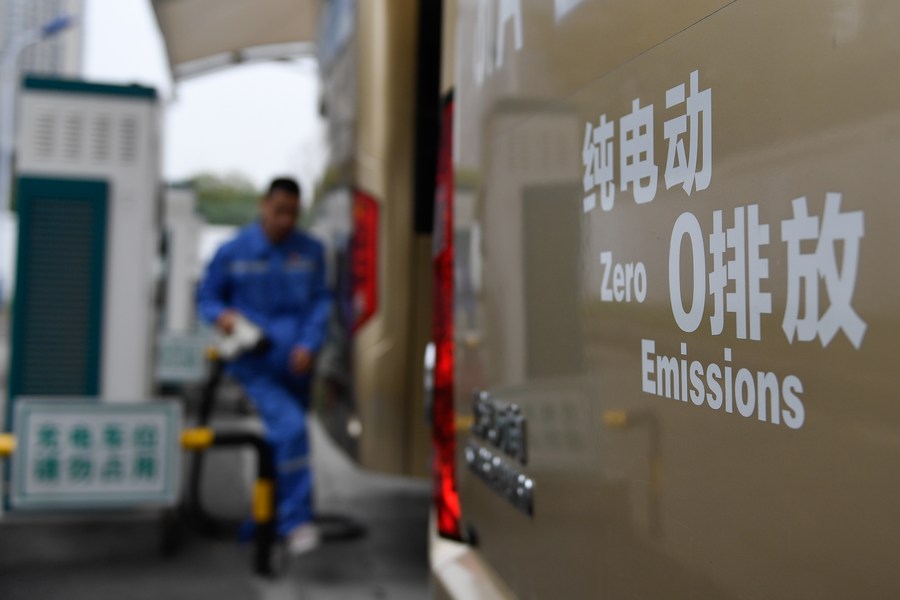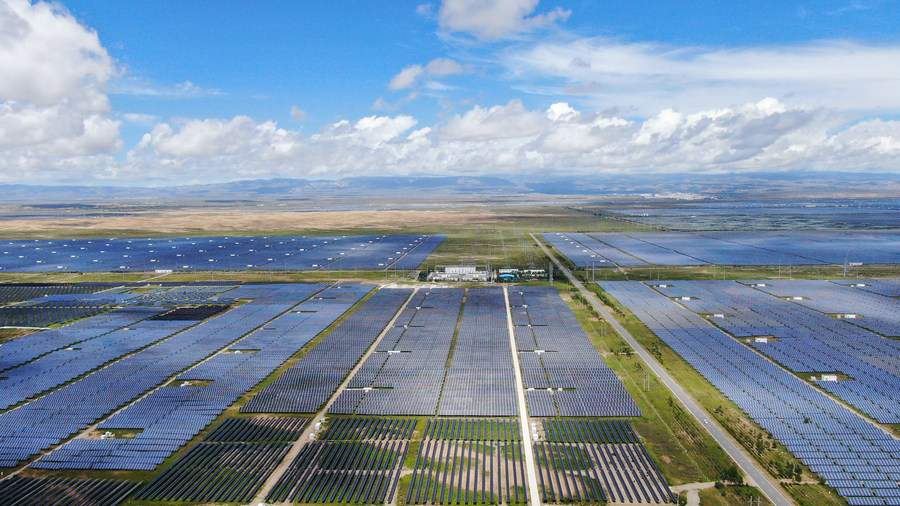

BEIJING, Dec. 12 (Xinhua) -- Chinese President Xi Jinping on Saturday announced the country's further commitments for 2030 to contribute more to tackling the global climate challenge, when addressing the Climate Ambition Summit via video link.
He said China will lower its carbon dioxide emissions per unit of GDP by over 65 percent from the 2005 level, increase the share of non-fossil fuels in primary energy consumption to around 25 percent, increase the forest stock volume by 6 billion cubic meters from the 2005 level, and bring its total installed capacity of wind and solar power to over 1.2 billion kilowatts.
Xi announced in September that China would scale up its nationally determined contributions and adopt more vigorous policies and measures, with goals to peak carbon dioxide emissions before 2030 and achieve carbon neutrality before 2060.

Aerial photo taken on Aug. 19, 2020 shows wind turbines in Jiucaiping scenic spot in southwest China's Guizhou Province. (Xinhua/Liu Xu)
"We will take solid steps to implement the targets just announced, and contribute even more to tackling the global climate challenge," Xi told the virtual summit, attended by dozens of leaders of both developed and developing countries, as well as international organizations, representatives of NGOs, and business leaders.
The summit, which aims to make new commitments to tackling climate change and delivering on the Paris Agreement on climate change, was co-convened by the United Nations, the United Kingdom and France, and in partnership with Chile and Italy.
"China always honors its commitments," Xi said.
He added that China, guided by the new development philosophy, will promote greener economic and social development in all respects while pursuing high-quality development.

A staff member charges an electric bus at a charging station in Hangzhou, capital of east China's Zhejiang Province, Nov. 21, 2019. (Xinhua/Huang Zongzhi)
President Xi's latest pledge showed that China, as a responsible major country, is committed to building a community with a shared future for humanity, said Li Zheng, executive vice president of the Institute of Climate Change and Sustainable Development at Tsinghua University.
At the summit, Xi urged the international community to pursue a new approach to climate governance that highlights green recovery.
Hailing the extensive international support to and participation in the implementation of the Paris Agreement since its adoption five years ago, Xi said the international landscape is evolving more rapidly, and COVID-19 is triggering deep reflections on the relationship between man and nature.
Saying the future of global climate governance is drawing greater attention, he made the following three proposals.
First, Xi called on all parties to close ranks and make new advances in climate governance that features win-win cooperation.
In meeting the climate challenge, no one can be aloof and unilateralism will lead nowhere, Xi said. "Only by upholding multilateralism, unity and cooperation can we deliver shared benefits and win-win results for all nations."
"China welcomes all countries' support for the Paris Agreement and their greater contribution to tackling climate change," Xi added.

A tram car runs past begonia flowers in Suzhou, east China's Jiangsu Province, March 28, 2018. (Photo by Xu Zhiqiang/Xinhua)
Second, Xi called for raising ambition and fostering a new architecture of climate governance where every party does its part.
Following the principle of common but differentiated responsibilities, all countries need to maximize actions in light of their respective national circumstances and capabilities, Xi said.
He also stressed that developed countries need to scale up support for developing countries in financing, technology and capacity building.

Aerial photo taken on Aug. 17, 2020 shows a photovoltaic power station at a green industrial development park in the Tibetan Autonomous Prefecture of Hainan, northwest China's Qinghai Province. (Xinhua/Zhang Long)
Third, Xi urged all parties to boost confidence and pursue a new approach to climate governance that highlights green recovery.
"Mountains and rivers green are mountains of silver and gold," Xi said, adding it is important to encourage green, low-carbon ways of life and production, and seek development opportunities and impetus from green development.
Echoing Xi's remarks, Li Zheng said the post-pandemic recovery must be a green recovery in response to climate change.
"By developing green infrastructure such as renewable energy, intelligent transportation and smart grid, people could make full use of the green transition as a new economic driver, which also adds decent jobs and boosts sustainable growth," said Li.

 Award-winning photos show poverty reduction achievements in NE China's Jilin province
Award-winning photos show poverty reduction achievements in NE China's Jilin province People dance to greet advent of New Year in Ameiqituo Town, Guizhou
People dance to greet advent of New Year in Ameiqituo Town, Guizhou Fire brigade in Shanghai holds group wedding
Fire brigade in Shanghai holds group wedding Tourists enjoy ice sculptures in Datan Town, north China
Tourists enjoy ice sculptures in Datan Town, north China Sunset scenery of Dayan Pagoda in Xi'an
Sunset scenery of Dayan Pagoda in Xi'an Tourists have fun at scenic spot in Nanlong Town, NW China
Tourists have fun at scenic spot in Nanlong Town, NW China Harbin attracts tourists by making best use of ice in winter
Harbin attracts tourists by making best use of ice in winter In pics: FIS Alpine Ski Women's World Cup Slalom
In pics: FIS Alpine Ski Women's World Cup Slalom Black-necked cranes rest at reservoir in Lhunzhub County, Lhasa
Black-necked cranes rest at reservoir in Lhunzhub County, Lhasa China's FAST telescope will be available to foreign scientists in April
China's FAST telescope will be available to foreign scientists in April